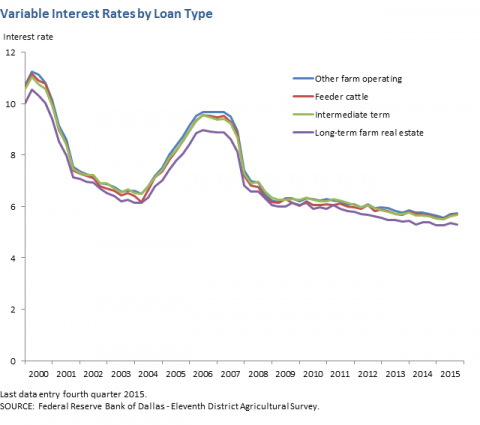Dallas Fed: Commodity Prices Impacting Credit Conditions
By: Dave Natzke, editor, Dairy Herd Management
Lower cattle, milk and crop prices are impacting credit conditions in the Federal Reserve Bank of Dallas region (covering all or portions of Texas, New Mexico and Louisiana), according to a fourth-quarter 2015 ag bankers survey. On a positive note, bankers responding to the survey reported moisture conditions were adequate to very good, with rains replenishing subsoil moisture and stock tanks.
Except for operating loans, overall demand for agricultural loans decreased in the quarter, reversing a five-quarter trend.
Feeder cattle loan volume was down 25% from the previous quarter, while dairy loan volumes were off nearly 20%. In the Texas Northern Plains, a banker said all categories of ownership from cow-calf producers to stocker operators and feeders are suffering from reductions in equity.
Loan repayment rates continued to slow, while loan renewals and extensions were up.
The credit standards index was mostly unchanged, although some bankers indicated tightening credit standards. While profit margins will be squeezed by lower commodity prices, savings will come from reductions in input costs such as fuel, fertilizer and supplies.
Interest rates were mixed from the previous quarter:
District-wide average interest rates compared to previous quarter
Fixed rate
- Feeder cattle: 6.04%, up 0.01%
- Other farm operating loans: 6.08%, down 0.08%
- Intermediate-term loans: 5.93%, down 0.12%
- Long-term farm real estate: 5.67%, down 0.12%
Variable rate
- Feeder cattle: 5.70%, up 0.05%
- Other farm operating loans: 5.73%, up 0.03%
- Intermediate-term loans: 5.69%, up 0.06%
- Long-term farm real estate: 5.31%, down 0.05%







